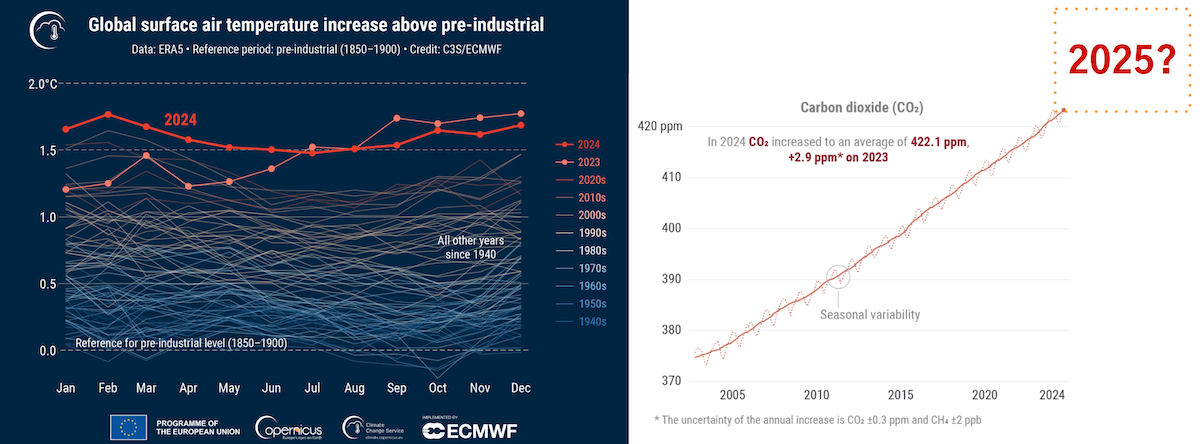
2024: A Record-Breaking Year for Climate Change
The year 2024 has officially been recorded as the hottest in history, with global average temperatures surpassing 1.5°C above pre-industrial levels—a critical milestone, even when accounting for the El Niño phenomenon. Human-induced climate change contributed to an alarming increase of 41 additional days of extreme heat worldwide, further stressing ecosystems and communities.
In 2024, the world also witnessed the most extensive coral bleaching event ever recorded, devastating over 75% of reef areas across 74 countries, highlighting the vulnerability of marine ecosystems to rising ocean temperatures. Meanwhile, Arctic sea ice continued its decline, reaching near-historic lows, further underscoring the rapid pace of polar warming and its cascading effects on global climate stability.
These climate extremes were mirrored in catastrophic events across the globe. Early hurricanes, such as Beryl, caused widespread destruction, while intense wildfires ravaged vast areas in Bolivia and Brazil. Severe flooding displaced millions and wreaked havoc in Florida, Brazil, Spain, Nigeria, Niger, Chad, and Mali, demonstrating the far-reaching impact of a warming planet.
Progress and Challenges Across Industries, Society, and Politics
The year 2024 was marked by a mix of significant advancements and persistent obstacles in the global fight against climate change.
Notable achievements
- Clean Energy Surge: Global clean energy investments soared to a record $2 trillion, surpassing fossil fuel investments. Renewable energy sources now account for over 30% of global electricity generation. Electric vehicle adoption also surged, with China leading the way, where over 50% of new car sales were electric or hybrid..
- Policy Momentum: The UK successfully phased out coal-fired power plants, while Hawaii fully transitioned its last coal facility, replacing it with battery storage. The EU took decisive action against corporate "greenwashing," and its Ecodesign for Sustainable Products Regulation (ESPR) came into force, setting new standards for sustainable product design and energy efficiency. The UK also detailed its CBAM introduction. Meanwhile, Brazil passed legislation to establish a regulated carbon market, Vietnam is set to pilot its carbon market beginning in 2025, and Indonesia has begun participating in the global carbon credits market, with a focus on energy projects.
- Landmark Ruling: In a groundbreaking first for Asia, South Korea's Constitutional Court declared the government's climate action inadequate and unconstitutional, emphasizing the rights of future generations.
- Win on Article 6.4: COP29 achieved progress on Article 6 Crediting Mechanism.
Significant setbacks,
- Rising Emissions: Global carbon emissions hit a record 37.4 billion metric tons. The growing energy demand of generative AI technologies further contributed to rising emissions.
- Insufficient Ambition: While 195 countries submitted their climate action plans (NDCs), their current targets fall short of the Paris Agreement's goals.
- International Stalemates: Negotiations on a global plastic pollution treaty failed, and the COP29 climate summit fell short of expectations, plagued by poor leadership, and the inadequate $300 billion climate finance agreement was highly criticized.
- Corporate Backsliding: Many corporations scaled back their previously announced sustainability commitments, undermining progress toward net-zero goals. This rollback appears to be driven, at least in part, by political pressures.
Where Are We Heading on Climate Change?
Looking ahead, climate regulation will continue to expand, with more countries adopting carbon pricing mechanisms and more comprehensive sustainability reporting requirements.
- Corporate Sustainability Reporting Directive (CSRD): In 2025, approximately 50,000 organizations will need to comply with the EU’s CSRD, significantly increasing transparency and accountability in corporate sustainability efforts.
- EU Ecodesign for Sustainable Products Regulation (ESPR): Set to take effect in April 2025, this regulation will drive higher efficiency and sustainability standards for products in the EU market.
- Mandatory Climate Disclosures: Australia will begin requiring companies to prepare annual climate-related financial disclosures. Additionally, regions such as Brazil, Hong Kong, Japan, and Turkey are expected to adopt IFRS S2, mandating listed companies to begin preparing climate reports.
- New Climate Commitments: The next round of Nationally Determined Contributions (NDC 3.0) is due in 2025, setting the stage for the next phase of global climate action
- Political Shifts: The incoming Trump administration has suggested pulling the U.S. out of the Paris Agreement. However, many individual states remain committed to their climate goals, ensuring continued progress at subnational levels.
While 2025 may see temporary setbacks in climate leadership, I expect long-term momentum remains unaltered. Political shifts may slow progress in some areas, but as climate impacts intensify, public and corporate pressure for meaningful action will grow organically.
Despite mounting challenges, the drive for climate resilience and sustainability will remain central to the global agenda. Regardless of political dynamics, industries will continue their steady transition toward a circular economy, driven by innovative business models that not only foster commercially viable, climate-conscious solutions but also outcompete traditional approaches.
